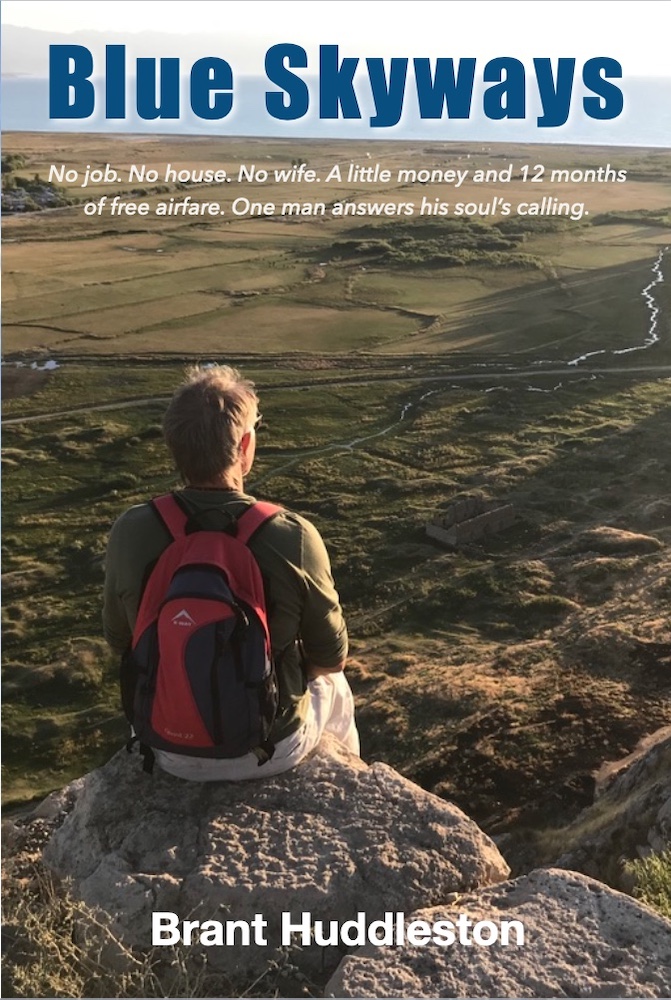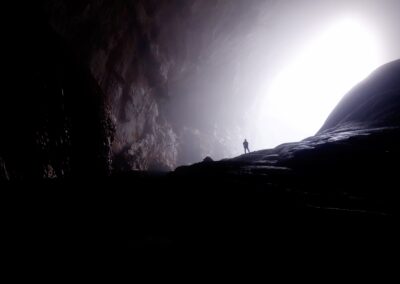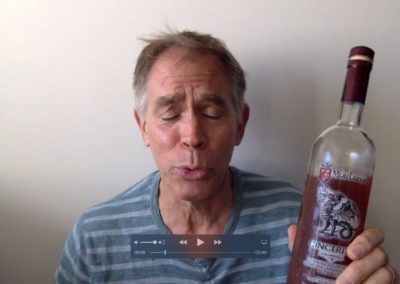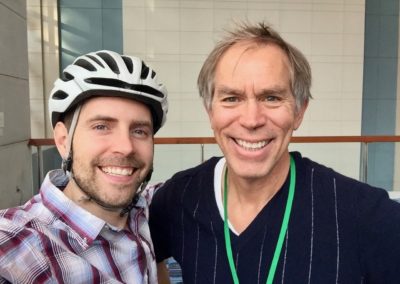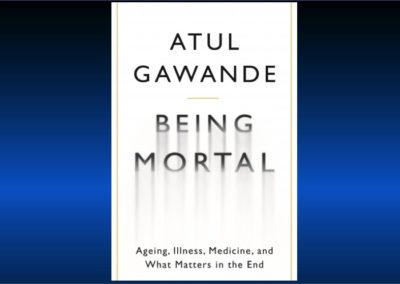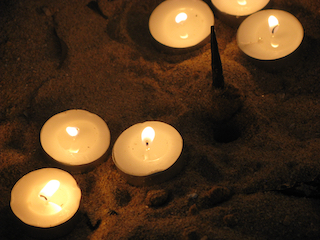Caves
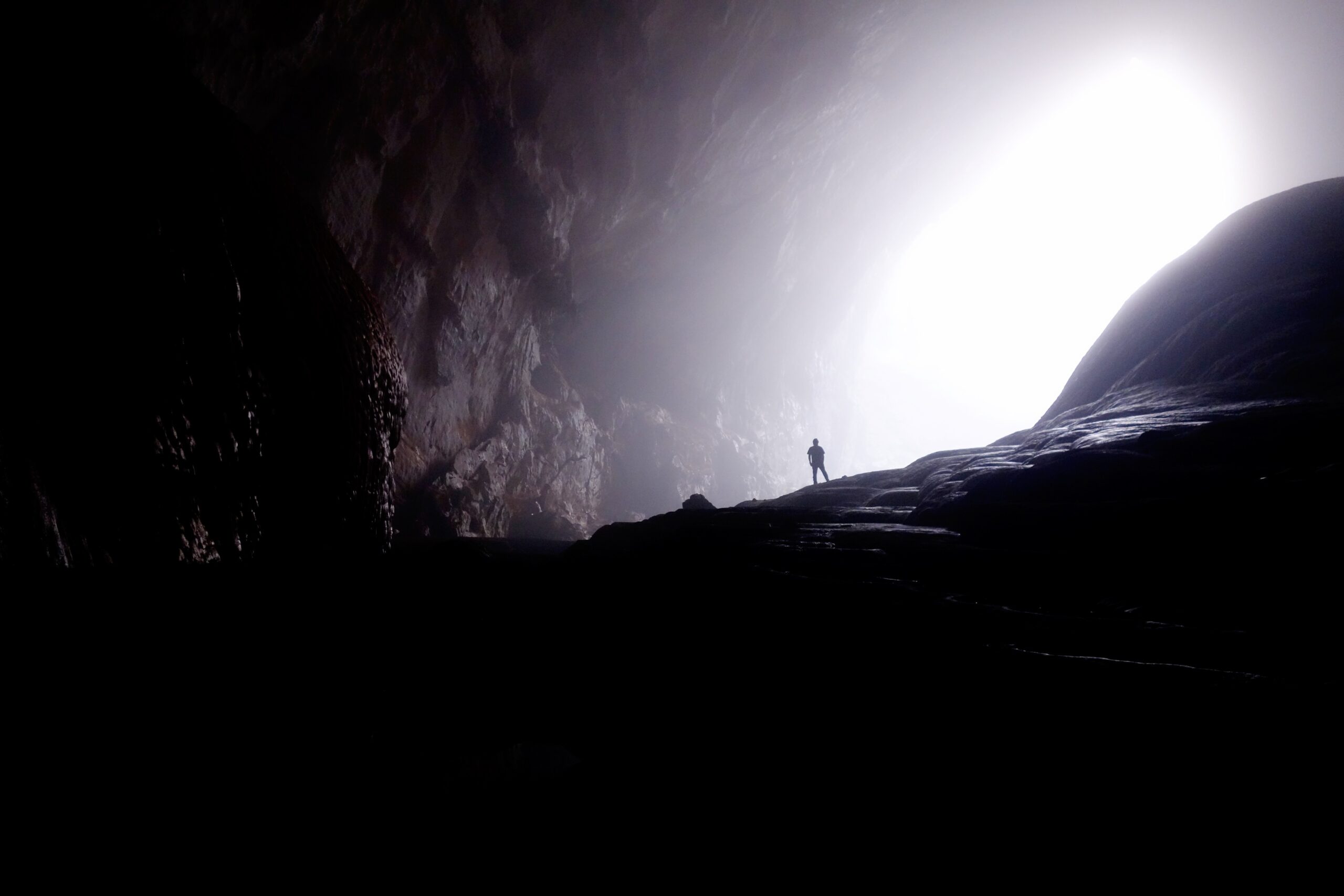
Below you will find a chapter from my book Blue Skyways. This chapter is especially important to me, as it attempts to explain how and why I left the faith of evangelical christianity after 30 years of devotion to Jesus Christ as my Lord and savior. The chapter is complimented by this 90 minute talk I gave in the fall of 2018 to an audience with The Afterlife Conference. After the chapter you’ll find links to essays on my ever-evolving spirituality. May they be a blessing to you.
Caves
The idea of God can become the final obstacle to God.
Meister Eckhart
Refreshed from my stay on the Island of Hvar, I rode the ferry back to Split and caught a flight to Prague, the capital city of the Czech Republic. Knowing I would be returning to majestic Prague later in my trip, I went directly from the airport to the train station. A short time later I was on a two-hour train ride to Brno, another large city in the south of the country. In Brno I was picked up by my dear friend and business associate, Václav Hodek, and taken to his comfortable home, where I stayed for the next few days.
Václav and his wife, Zuzanka, have two young sons — Václav VI (age three) and Petr (age seven months). They all live together in a roomy second story flat located in a small village about a 25 minute drive from downtown Brno. Tired from my long trip, I was grateful for the comfortable sofa Zuzanka prepared for me, and soon was fast asleep. Hunger makes any meal delicious, and fatigue makes any bed wonderful.
The Czech countryside is a picturesque patchwork of green rolling hills and vast yellow fields peppered with occasional tidy gatherings of gray and white farmhouses. The yellow fields are from the flowering “rape” plant, the seeds of which produce an edible oil we Americans call “Canola” oil, branded so because “rape seed oil” would probably not sell well.
“Why so many fields of rape plant?” I asked Václav. He laughed.
“They are almost all owned by Andrej Babiš, the current prime minister of the Republic. We Czechs all know rape is over-planted, but because Babiš has a corner on the rape oil market, the madness continues. It is somewhat of a national embarrassment.”
And so I saw, flowering before me, a bright yellow example of how unevenly a country and its people move from the tyranny of Communism to the exploits of Capitalism, two imperfect systems. I was later to learn, during a visit to Prague’s Museum of Communism, just how uneven, how slow, and how violent that progress had been for the Czech people. But for now, there was a famous cavern to explore.
Just north of Brno, about an hour’s drive from Václav’s home, is the Moravian Karst region of the Czech Republic — a protected nature reserve of some 92 km². This region is known for its deep, breathtaking gorges and complex system of some 1100 caverns. We planned to visit two of those — the Sloup-Šošůvka Cave and the Kůlna Cave, connected by a man-made corridor.
Since it was a beautiful, warm spring day, Zuzanka chose to stay topside with the baby while the eldest son, Václav, and I put on jackets and followed a guide into the gaping mouth of the Sloup cavern. We were underground, sometimes deeply so, for about two hours. While the tour guide spoke only Czech, Václav equipped me with a smartphone app he developed that explained everything in English so I was able to follow along.
I’m not sure what compels certain men to leave the topside of the earth, with its fresh air and sunshine, and climb into a dark hole in the ground, but some do. Now imagine doing that kind of spelunking hundreds of years ago with only an oily torch for illumination and fears of subterranean devils, three headed dogs, and prehistoric beasts very much alive in your imagination. This is how most of the Moravian Karst caves were discovered and explored.
The rate of exploration accelerated considerably in the mid-19th century with the invention of dynamite. It astounds me that anyone would drill into rock, load it with explosives, detonate, and then clear out the resulting rubble, all by hand. The amount of work involved is mind-boggling. Early explorers labored blindly for years, day after day, with pick and shovel, blasting away, completely uncertain that they would find anything at the end of their efforts. More than one died in the bowels of the earth.
As the three of us moved deeper and deeper into the cave system, walking from one chamber to another, I recalled Plato’s allegory of the cave, suggesting real knowledge must be gained through philosophical reasoning and not just physical perception. It occurred to me that Plato’s cave allegory might be expanded to include spiritual as well as philosophical reasoning.
As spiritual explorers, we follow some brave person who has gone ahead and picked a path through the rock of human ignorance, seeking an expansive opening in an otherwise dark and mysterious spiritual world. In the physical world, we can only see in the dark with the help of illumination, and the same is true in the spiritual world.
Sometimes that illuminating light is as petite as a candle flame, say a wise word from a child. At other times the light is brighter, like a torch, and comes by virtue of mystics and spiritual teachers, of which there are many, from Sunday School teachers to Gandhi. Finally, and rarely, our darkness is set ablaze with the nearly blinding brilliance of spiritual geniuses like Jesus, Mohammed, and the Buddha.
Each of these spirits lights the way for us. They see just a bit farther into the darkness than we do, and we are wise to heed them. But mind you, no matter how wise the teacher, or how grand the cavern in which they teach, or how brightly the cave is lit, we are still in one, with walls, a floor, and a ceiling. We are still under the earth, in the dark, and asleep.
I view my 30-year journey through Christianity like exploring one, and only one, chamber of a vast cave system. That Christian chamber was large, diverse, and full of secrets to discover. There was more than enough there to spend a lifetime learning and growing, should one want to.
But in my case, I eventually felt boxed in, claustrophobic even. I wanted the Christian cave to be different than it was. This motivated me to start looking for a way out.
While I had many issues with Evangelicals, including their confusion of patriotism with faith, their penchant for war, their intolerance of others, their patriarchy, and their attachment to materialism, at the top of my list of objections was their concept of hell. The idea that God, our so-called “heavenly father,” would cast one of his children into eternal conscious torment, with the gnashing of teeth and all that, did not jibe with my understanding of what it meant to be a loving father.
I have three daughters. All rebelled as teenagers in one way or another, and one of them especially so. She is the one who gave me most of my gray hairs. I call her my “payback child,” for she paid me back for all the angst and trouble I gave my parents, and then some.
But even in the darkest hour of that daughter’s rebellion, when she was screaming “I hate you” and acting out in the worst of ways, never did I give up on her. Sure, it hurt me, and I would get angry, but she was my kid, and I wasn’t going to abandon her no matter how bad it got. To me, that’s what a loving father (or mother) does, and I did not understand how God would be any different with one of his children.
It is so easy to just repeat Christian dogma like a parrot without really thinking it through, but I wonder how many Christians would hesitate if they were the one whose hand was on the lever that drops the condemned into a lake of acidic fire, only to watch them writhe in agony forever from the safety of a righteous perch. What if that condemned person was someone they know? What if it was their own child? Would they pull the lever?
I doubt they would. Nietzsche has a saying about the “pale criminal” — the one who has the courage of the knife but not of the blood. Since I lack courage for both the knife and the blood, I wanted to ditch the whole idea of hell. But doing so mitigates the need for salvation, and thus the Cross, and pretty soon the whole damn Christian thing comes unraveled, or at least as it is currently understood.
Evangelicals explain hell and damnation by saying, with a shrug, “God’s ways are not our ways,” but I do not follow their logic. Were we not made in God’s image? Do not Christians have the “mind of Christ” as the Bible says? Is that not a mind that helps us understand our world and guide our decisions? If God’s ways are not our ways, then what kind of being is he, or she, or it?
An alien?
A foreigner?
A stranger?
Where is the Abba (“Daddy”) father that we long to trust in our hour of need?
These questions, and others like them, had me exploring the outer boundaries of the Christian cave, in the shadows, off the paved path, and out of the well lit and safe mainstream. To my surprise and comfort, I found others there, groping in the dark alongside me, and asking many of the same questions. Regardless of our sect or denomination, we had a sense that there was something else out there, something that transcended our spiritual confines. We were seeking answers, and through honest exploration, some of us found a passage into another part of the cave system.
So in the summer of 2006, after 31 years in the Christian cave, I crawled into a narrow corridor leading out of that splendid chamber. I was scared to death. When you are as deeply built into the system as I was, and you are losing your faith, it’s a harrowing experience. Once I even glanced back, to see if the way to Christianity was still open to me, but it was not. The only way through was forward.
I could have stayed in the Christian cave for the rest of my life, but I chose to walk down the passage leading to a different chamber of the cavern, and to a place beyond Christianity. I was consciously moving from something to something else.
Despite hymnbook promises of “peace like a river” and “Joy! Joy! Joy! Everlasting joy,” I had neither peace nor joy in the summer of 2006. My life was falling apart. I was overwhelmed by a series of personal crises — a dear loved one’s attempt at suicide, several job losses, a business failure, and the slow, painful end of my 29-year marriage. Since family and business success were central to my egoic identity, these “failures” were devastating to me. There are sobs that can take your breath away. I knew them well.
On every hero’s journey there is a place so forlorn that you feel you have been abandoned by everyone, even God. It is the place where the crucified Jesus cried out, “My God, my God, why hast thou forsaken me?” It is the place where the poet Rumi said, “Where have you gone my love? You left me broken, hopeless.” The Catholic mystics refer to that place as “The dark night of the soul.” That summer, I found myself in that place — scared, terrified really, broken, and confused.
One day I was so anguished that I rode my motorcycle up to the huge Baptist church I was attending and asked to see the senior Pastor. “He’s not here,” his secretary said, “But you can see one of our associate Pastors.” I reluctantly agreed.
I don’t remember anything about this man, not his name or even what he looked like. But what I do recall from that day is that he listened patiently while I wrung my hands and poured out my woes, asking the questions that were on my heart and mind, but not really expecting answers.
When I was done, all he said was, “Have you ever heard of the Emergent Church?” When I said, “No,” he said, “Go home and Google it,” and so I did.
That is how I learned about Brian McLaren, Philip Yancey, Henri Nouwen, John Eldridge, and other thoughtful Christians who felt much the same way I did, some of whom are part of a loose organization called “The Emergent Church.” Their teachings were the sweet smell of grace and fresh air that I longed for, one that suggested there was a way out of my anguish.
The first Emergent book I read was McLaren’s A Generous Orthodoxy: Why I Am a Missional, Evangelical, Post/Protestant, Liberal/Conservative, Mystical/Poetic, Biblical, Charismatic/Contemplative, Fundamentalist/Calvinist, Anabaptist/Anglican, Methodist, Catholic, Green, Incarnational, Depressed-yet-Hopeful, Emergent, Unfinished CHRISTIAN. That book really changed my world-view and helped me feel less alone.
Of the many good things I learned from Emergent thought leaders, two stand out in my mind. The first is the idea that the Bible is not a book of laws, as I had come to see it, but rather a love story with epic sweep and grandeur. Understanding this was helped a great deal when I actually quit reading the Bible, verse by verse, and started listening to it on tape. Not only would I hear an entire book in one sitting, as it was intended to be experienced (many early Christians were illiterate), but there was also something different happening in my brain, in the way I processed the information.
I don’t pretend to understand the neuroscience behind this — I only know that I experienced the Bible differently when it came in through the two holes on the sides of my head rather than the two on the front. As the Bible says about itself, “Faith comes by hearing, and hearing by the Word of God.” Hearing the love story, without the interruption of chapter/verse designations, somehow made a difference.
Carving the Bible up into numerical chapter and verse (e.g. John 3:16), although convenient for reference, has the ill effect of depersonalizing the scriptures, expunging the author, and making it nearly impossible to know, for any given text, who wrote it (e.g. Moses), when it was written (say, 50 years after Jesus’ death), and for whom it was written (say, the Hebrews of 500 BC). The unfortunate result of this practice is that many novice Bible readers tend to assign the same weight to every verse.
For example, some will take a verse from the Old Testament book of Deuteronomy, written for the Hebrews in the 7th century BC, and apply it to their lives with the same intensity as say, a New Testament verse from Galatians, written thousands of years later for both Jews and non-Jews.
The result of this misguided practice is a terrible imbalance where the Old Testament stories of genocide, blasphemy, stonings, homophobia, misogyny, and war lose their context, and thus tend to overwhelm the more subtle New Testament teachings of grace, forgiveness, tolerance, gender egalitarianism, peace, and mysticism. This imbalance is one root of legalistic and hard-hearted Christians, who view God as more righteous judge than merciful guide, more harsh disciplinarian than loving parent. They have given too much weight to Old Testament scriptures useful for modern humans, but only in context.
Even the New Testament is distorted when one views it, and the person of Jesus, through the lens of modern history, which (in the United States, at least) has been dominated by the influences of first, the Roman Empire, with its successful applications of law, order and hierarchy, and second, the Greeks, from whom we derive democracy. These powerful historical forces are seen everywhere in the western world, from our architecture to our understanding of scripture.
Largely absent from the western thought paradigm are eastern ideas, which is odd, as Jesus was a swarthy desert Jew from the east — not the Hollywood handsome white guy in clean blue robes most of us see in church pictures. It is yet another distortion of the Christ and his teachings. But the eastern Jesus, such as the one you encounter in the writings of Thích Nhát Hahn and Eckhart Tolle, was a person forbidden to me during my years in the faith. I had to leave the faith to gain the perspective where I could see Jesus as the eastern mystic he truly was. I had to leave the cave.
To his disciples, the Apostle Paul said “I feed you milk because you are not ready for solid food,” implying there was more, much more, beyond his letters, beyond the Bible, beyond words, beyond speech, and beyond ideas. God, the Bible, the Christ, the crucifixion — these are all just metaphors “for a mystery that transcends all human categories of thought,” as Joseph Campbell said.
The great Christian mystic Meister Eckhart said, “The idea of God can be the final obstacle to God,” and, according to Heinrich Zimmerman, “The best things can’t be said.” Today, when speaking of “God,” I find myself speechless, and I think appropriately so.
Whenever I encounter a person who pulls a single verse out of the Bible and starts slapping me around with it, I know I am dealing with a person trapped in a prism where they understand their faith through layer upon layer of thick Greco/Roman lenses. These lenses distort the Christian story, concretize it, polluting it with relatively modern and totally western ideas of law and order, fear and punishment, reason over nature, war and conquest, and the dominance of the patriarchy over the divine feminine. They lead to an impoverished, provincial view of Jesus, and a puny god.
We have this distortion to blame for many of the problems we deal with today, not the least of which is gun violence, racial and gender inequities, and climate change. We suffer greatly because of imbalances deeply embedded in religion, and the whole earth groans to put it right.
The second lesson I learned from Emergent Christians is that not every question needs to be answered, not every “i” dotted and “t” crossed. This was a huge relief for me, because studying the infinite with any honesty always results in a conundrum — the more you learn, the less you know. I was studying my faith with great earnestness, albeit in a cave, and I was generating a flood of questions and doubts that I felt all needed resolution. Why, even the Apostle Paul, the very architect of Christendom, said, “For now we see only a reflection as in a mirror; then we shall see face to face. Now I know in part; then I shall know fully, even as I am fully known.” He knew that he did not know.
My effort to try to know what cannot be known, however, did not lead to resolution; in fact, it led me in the opposite direction, to a place the Buddhists call the “I don’t know” mind — that state of being beautiful for what we don’t know, for what we don’t try to batten down and box up. It is “the child’s mind” we need to grow and expand — that state of wonder and openness where we are at peace with the questions. This is what I learned from the Emergents, and later from the Buddhists.
As with everyone on a spiritual journey, I only peer into a mirror darkly, but at least I keep looking. What I barely glimpse there is an eternal truth, beyond anything I say here, but hinted at by the Persian mystic and poet Mansur al-Hallej, who like Jesus was killed for speaking his truth. Hallej said:
I saw my Lord with the eye of the heart
I asked, “Who are you?”
He replied, “You.”
***
Before we leave the caverns, I want to tell the story of Jaromir Braun, an expert blaster who is largely responsible for the approximately 80 meter long man-made corridor that connects the Sloup-Šošůvka Cave with the Kůlna Cave.
For nearly ten years, year after year, day after day, Braun descended into the darkness of the Sloup cave, loaded with gear including dynamite, blasting rock and then clearing away the rubble by hand. With no modern scanning equipment to help him, Braun inched his way forward toward something he only sensed was there, and that we now know was — the Kůlna Cave. Today, the corridor Braun dug is marked with his progress — 10 meters one year, eight another, 12 the next, and so on.
The spiritual journey is like that. It is hard work. Our rate of progress varies. We have to keep at it, despite our doubts, or perhaps because of them. There is the nagging thought that, despite all the promises and hopes of a glorious afterlife, that there is no “there” there, that we are digging in vain toward what the 15th century monk François Rabelais called “the great maybe.”
Maybe.
Ironically, Jaromir Braun was a mere 15 meters from a breakthrough into the Kůlna Cave when he was killed in a blasting accident. All those years of toil and sacrifice, only to die on the cross he picked up and was carrying, meter by grueling meter, toward a paradise he could only imagine.
But others finished Braun’s work, and today millions of visitors from around the world enjoy the beauty and splendor of the Sloup-Šošůvka and Kůlna Caves, connected by the Braun corridor. I was one of those visitors.
Thank you and rest in peace Mr. Braun. I never met you in this world, but I’ll meet you in the next…topside.
###
Books by Brant
Most Recent
For Christmas 2018, my brother, a pilot with American Airlines, gave me a gift that became the experience of a lifetime: 12 months of free travel anywhere American Airlines flies.
Thus began a year long journey that took me from the rocky coasts of Portugal, to the hot sands of Morocco, to the mangrove swamps of Panama, with many places beyond and between. In cheap hostels and the backwaters of the nomadic milieu, I discovered a treasure chest of colorful and fascinating people. I tell their stories and a bit of my own.
The trip became as much a spiritual and emotional journey inward as it was a literal outward one, and found me in a place those of you who are in the second half of life are likely to recognize.
With references to the philosophies of Carl Gustav Jung, Jesus, Bob Dylan, and the Buddha, Blue Skyways is an international romp by a man in his 60’s with not much more than a pack on his back, and still much to learn.
A suspense/thriller novel!
When a psychology doctoral student Brian Drecker uses advanced software to analyze dreams from around the world, he discovers odd patterns that cannot be explained. Where one person's dream ends, another's begins. Unique objects appear again and again...even though the dreamers are complete strangers.
Drecker discovers the patterns form a map pointing to an ancient, lost object. Soon after, he is mysteriously murdered, leading his deadbeat brother and estranged wife on an international race to find the treasure, and the murderer. Along the way, the troubled couple are opposed by dark forces of the religious underworld, who launch a global pandemic to ensure the map of dream's secret remains lost forever.

